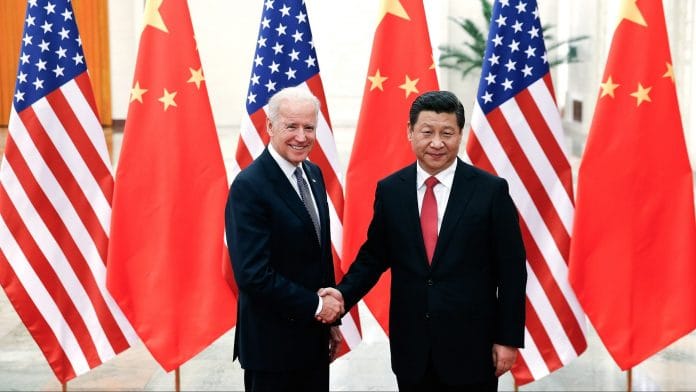New Delhi: An anonymously authored paper published in the Atlantic Council, titled The Longer Telegram has created a buzz in the strategic world, globally. The paper says China is the single biggest challenge for the US in the 21st century.
In episode 676 of ‘Cut the Clutter’, Editor-in-Chief Shekhar Gupta analysed some key points that emerge from this paper.
Rise of an authoritarian China under Xi Jinping
The paper says the rise of an authoritarian China under Xi Jinping is the single most important challenge facing the United States. It separates the Communist Party from the country and underlines party’s General Secretary Xi’s rise as the real threat.
The paper goes on to say that US policy should be laser-focussed on Xi and his inner circle and understand how to operate within China’s political strategic paradigm. US policy that is directed towards changing China’s behaviour must revolve around understanding China’s politics, or it will be ineffectual — which means play with Chinese Communist Party politics, Gupta explained.
The paper also says that under Xi, China has seen a return to a purely classical Marxist Leninist construct, and the rise of a quasi Maoist personality cult, which includes the elimination of all political rivals. It adds that the private sector in the country, though flourishing, has come under Communist Party’s control, “Jack Ma is a good example of this,” added Gupta, “This is state capitalism, the ultimate example of state capitalism, where you can have a company but the party will control it.”
The author also says Xi Jinping’s China is a revisionist power — “through this the author means that China wants to change things in a big way. Xi is not accepting living in a continuum from his predecessors,” Gupta said.
The paper goes on to say that the USA and the democratic world will feel Xi Jinping’s glare in the harshest way which is why Xi should be the primary concern.
Also read: ‘Anonymous’ author’s paper on US’ China strategy makes a buzz, has sharp message for India
China’s weaknesses
The paper argues that China’s critical vulnerability lies in its economy. “The Chinese Communist Party has a social contract with the people of China, which is that we guarantee you economic growth, employment, and continuous improvement in living standards. And as long as that is happening, people have agreed to let the Communist Party have dictatorial power — that is the social contract,” explained Gupta. “The author’s argument is that if anything happens that sends China’s economy into recession, this social contract will begin to fray.”
The paper says the rise of a personality cult after Mao has led to seething anger, distrust and resentment within the Chinese Communist Party, which is what the US can exploit. China’s transformation into a surveillance state with physical coercion against rivals has also led to anger, fear and resentment within the party — that is another crack in the system.
What US needs
The paper’s author is extremely critical of the way in which the US has dealt with China so far and says it doesn’t even have an operating strategy on Beijing yet.
The author cites the United States National Security Strategy (NSS) 2017 but says the document is not a detailed operational strategy, and that there were disagreements within the Donald Trump administration on how to deal with China.
The author says America should ensure dominance in the Indo-Pacific region, arm Taiwan, protect Japan’s territorial integrity and prevent China’s expansionism in the South China Sea.
The author also suggests a bunch of red lines like the threat of a nuclear, chemical, biological attack on America or its treaty allies, either from China or from allies of China, particularly North Korea. “Remember, the USA has 47 treaty allies and India isn’t one of them,” added Gupta.
About India
The paper says China’s strategy towards India and Japan will remain uncertain, and there’s no telling if China wants to de escalate the situations it has created. America needs “ a fully operationalized Quadrilateral Security Dialogue (Quad) with India, Japan, and Australia by inducing India to abandon its final political and strategic reservations against such an arrangement,” reads the paper.
Two other points from the paper that will interest India is its suggestion to stop China’s expansionism not just among treaty allies, and that the US must not stop immigration.
The paper also hints that India will have to step in to convince the United States that it cannot be at odds with both China and Russia simultaneously.
Watch the full episode here:
Also read: India’s defence needs money. If Budget can’t provide it, we need to change how we fight







Thanks for drawing attention to the Atlantic council’s article and also for the nice summary.
What would be the impact of increasing authoritarianism on the economic front? Will China slowdown? Private industry in China benefited from the relative economic freedom that prevailed in the last 30 years. Probably that is changing as well.